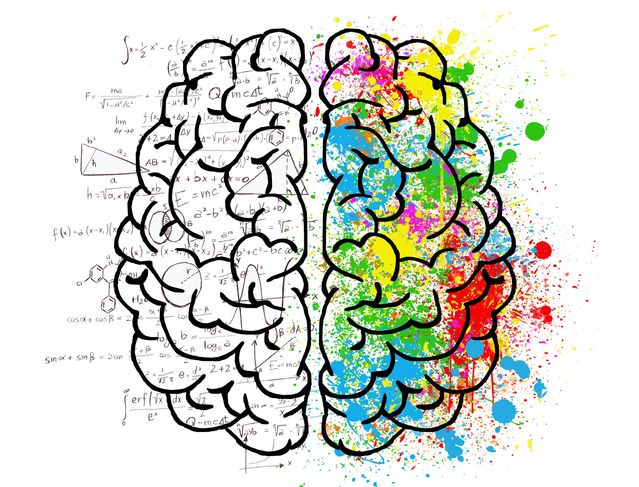Unconscious
7 Super Simple Tips for Unlocking Your Creative Genius
Here are a few science-backed hacks that are sure to boost your creativity.
Posted May 22, 2018

Novices often assume that creativity occurs solely in the conscious mind. They try to will their muse into being. But experienced creative geniuses know better. They know that the true source of their creativity resides in their unconscious mind.
For example, in his book Bag of Bones, Stephen King describes the writing process as analogous to having a bunch of guys with a truck pull up and unload furniture into your basement. Furniture you can’t see because it’s all wrapped in padded quilts, but you don’t need to see because you know it’s everything you need to write your story. All the writer has to do is unwrap each piece, carry it up the stairs, and set up in the correct rooms.
In King’s analogy, the “boys in the basement” are his unconscious mind. His muse. He is suggesting that as a writer he doesn’t create the story elements; they already exist within his unconscious. His job is to merely pull each story element from his unconscious and arrange it so as to make the best story.
What is the Unconscious Mind?
Psychologists have long held that the mind has two major systems: conscious and unconscious. The conscious system is the part of the mind we are aware of. It’s the part of us that debates options and makes decisions. People generally assume they are aware of everything that happens in their own mind, but in fact, they are really only aware of this conscious aspect.
The unconscious system occurs outside of our awareness or control. It is the part of the mind that handles all the heavy lifting so we can live our lives more easily. It is always running in the background, scanning all the millions of pieces of information that bombard our brains and determining what gets passed to our consciousness and what gets buried. Our unconscious mind is a treasure trove of forgotten experiences, emotions, ideas and memories. Unlike its conscious sibling, the unconscious mind is able to process this wealth of data very quickly and efficiently. And allowed to, it can make novel connections between all this seemingly unrelated information, which is essentially what creativity is all about. Amazingly, it does this all without us even being aware of it chugging away in the basement.
The unconscious mind is often thought of as a dumb creature, only able to deliver basic “tip of the tongue” facts or give us strange dreams about talking Rhinoceroses. But a great deal of research suggests it is actually our unconscious mind who is responsible for most of our decisions and innovations. Our conscious mind just takes the credit after the fact. For example, one study by John-Dylan Haynes and colleagues found that brain activity increased several seconds before participants made a conscious decision to move their finger. That means that their unconscious mind had decided to move their finger well before their conscious mind had.
Recognizing that ideas don’t just get consciously invented out of thin air may shake your sense of free will, but it is also incredibly freeing. It means you don’t create creative ideas; you unearth them from your unconscious. It means that you already have the idea for your next great story, song, scientific breakthrough or invention lurking down deep inside of you, you just have to help it find its way out. But here is the rub: the unconscious mind is a shy creature. It only comes out to play when there are few distractions or noises to scare it off. As a result, it is very hard to just force yourself to be creative. You can’t just tug at the leash and expect your inner muse to come running (as any writer will tell you, do this and all you’ll get is a bad case of writer’s block). Instead, you need to coax it out of its den by dialing down anything that would activate your conscious mind.
Lucky for us, creative geniuses far more successful than us have found ways to accomplish this. Through trial and error, they have discovered ways to unlock their inner muse. Let’s explore a few such tips from some famous writers that are also backed up by science.
Seven Tips for Unlocking Your Creative Genius:
1. Sleep On It
John Steinbeck wrote in Sweet Thursday, “It is a common experience that a problem difficult at night is resolved in the morning after the committee of sleep has worked on it.” Research backs this one up. A study published in Nature found that people who were given a creative task to solve and then allowed to sleep on it were more successful than those who remained awake to solve it. Sleep allows your unconscious mind to restructure information, resulting in new and insightful responses. Just make sure to keep a notepad by the bed for when inspiration strikes.
2. Give Yourself Permission to Daydream
“You get ideas from daydreaming,” Neil Gaiman once told his seven-year-old daughter’s class when they asked him where he got his ideas. “You get ideas from being bored. You get ideas all the time. The only difference between writers and other people is we notice when we're doing it.” In support of Gaiman’s assertion, a 2013 review of mind-wandering studies found that when people had a task and were given a break in which their mind could wander, their responses were more creative. So rather than avoiding moments of boredom with your smartphone or social media, relish in the boredom. Use those moments of riding on the subway or sitting in the waiting room to daydream, just like you used to do as a kid.
3. Drink Up (Within Reason)
For as long as artists and writers have been around, they’ve been using alcohol (or other mind altering substances) to uncork their muse. From Poe and Hemingway to Faulkner and King—the list goes on and on (and on). As any drinker can tell you, alcohol weakens the unconscious mind. But a word of warning. It is one thing to use a small amount of alcohol to boost creativity; it is another to succumb to alcoholism. So how much is enough? One study found that a blood content level of just .075 was enough to improve people’s creativity (that’s roughly equivalent to two glasses of wine or two beers).
4. Keep Your Hands Busy
Something that uses your hands but allows your mind to be free to wander. Stephen King wrote in Bag of Bones, “I made no effort to think—an old trick from my writing days. Work your body, rest your mind, let the boys in the basement do their jobs.” Research supports this argument that busy hands results in daydreaming minds. Good options are household chores like dusting and vacuuming, physical hobbies like knitting or woodworking, or just doodling or using a “fidget widget” (e.g., Slinky, Fidget Spinner, smooth stone). Anything that busies your hands and focuses your conscious mind, allowing your unconscious muse to freely roam. This is probably why many writers, including J. K. Rowling, Joe Hill, Joyce Carol Oates, Neil Gaiman, Danielle Steel, and Clive Barker, prefer to write their stories longhand.
5. Write During Your “Off Time”
People have what scientists call a circadian preference, which essentially means they are either morning people or evening people. You probably assume it is best to write during your most optimal time (morning people writing in the morning, evening people in the evening), but that’s not true. Although analytical thinking—the kind you use to solve math problems—is better during people’s optimal times, a 2011 study found that creativity was actually better during people’s non-optimal times. Because our conscious mind is groggy during our non-optimal time, it relaxes the reigns on our unconscious mind and gives it more freedom to wander.
6. Take a Shower
A survey conducted by creativity expert Scott Kaufman found that 72% of people report having a creative breakthrough in the shower. This is a secret writers have known for a long time. Agatha Christie, Edmond Rostand, and Dalton Trumbo all wrote while soaking in their tubs. And Woody Allen once stated in an Esquire interview that he frequently uses long showers to break through writer’s block. So why is a shower so good for creativity? It is an activity that is relaxing, done in isolation, and lacks other distractions—all essential components for unlocking your inner muse. To best optimize your shower, consider buying bathtub markers or a waterproof notepad so you can immediately jot down all your amazing ideas.
7. Get Outside
Nature is one of the best places to reacquaint yourself with your unconscious mind. Lots of writers go for walks or run outside to get their creative juices flowing. Stephen King walked four miles every day (until a freak accident stopped him). Joyce Carol Oates is an avid runner who stated, “The structural problems I set for myself in writing, in a long, snarled, frustrating, and sometimes despairing morning of work, for instance, I can usually unsnarl by running in the afternoon.” Research backs up this tip too. Study after study has shown that walking in nature (or even just viewing images of nature) boosts creativity by as much as 50%. Plus, as an added bonus, getting outside has been shown to reduce stress, increase happiness and boost physical health!
Creativity Requires Both Unconscious and Conscious Minds
Once the “boys in the basement” send up a good idea, you still have to work hard to unearth it and turn it into a reality. For example, if you are a writer, that means allowing your unconscious mind to drive the story during the initial writing phase and making sure your conscious mind isn’t getting in the way. As author Ursula K. Le Guin once said, “All I seek when writing is to allow my unconscious mind to control the course of the story, using rational thought only to reality check when revising.” But once the initial draft is written, that’s when you want to invite your conscious mind to the party. Your inner muse may design the first draft, but it is up to your inner editor to perfect the story and get it to the finish line.
For more tips on how you can use psychological science to boost your creativity, check out The Writer’s Laboratory at www.melissaburkley.com




